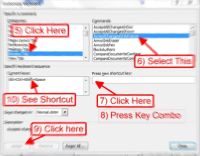 One of the “rules” often repeated for authors is to know your audience and to write to that audience. This seems obvious until you start trying to break it down. In reading dozens of articles and books on writing everyone agrees that writing for your audience is important. Yet, I have found zero discussions that provide anything more than descriptive hand waving on this subject. In trying to understand if I am doing this well I have dug down deep into the blogs and interviews of the authors I consider to be doing a good job of reaching their self-described audiences. I have also read with an analytical eye their books paying attention to vocabulary usage, scene complexity, and especially descriptions of internal feelings and internal dialog.
One of the “rules” often repeated for authors is to know your audience and to write to that audience. This seems obvious until you start trying to break it down. In reading dozens of articles and books on writing everyone agrees that writing for your audience is important. Yet, I have found zero discussions that provide anything more than descriptive hand waving on this subject. In trying to understand if I am doing this well I have dug down deep into the blogs and interviews of the authors I consider to be doing a good job of reaching their self-described audiences. I have also read with an analytical eye their books paying attention to vocabulary usage, scene complexity, and especially descriptions of internal feelings and internal dialog.
From all of this I have found some common threads to follow. Audiences are generally broken down by “Gender”, “Race”, “Age”, “Education Level”, and “Social-Economical Status.” For fictional writing you also need to consider the “Genre” and “Level of Genre Exposure”.
For example you can say “I want to write for Young Adults (YA) both girls and boys between the ages of 14 and 18 who have a basic public school level of education and are from middle class homes of $40 to 60k incomes” that is a pretty large audience. Another large audience would be “I want to write for Young Adult (YA) girls about 14 years old from poor families on welfare near to dropping out of school.” These two audience definitions are almost the same age range, but vastly different targets and will require very different subject matter, tone, and diction.
This leads into finding the right mix. New authors might consider sticking to something they know well, such as their own lives. In order to reach people you need to connect so you need to know what words are well understood, the proper tone and what subject matter will be of interest in each scene. You can write the same story with the same plot in a dozen completely differently ways depending on the target audience. With some research and specifically finding some people within the target audience to help a story can be produced that will resonate with the target audience.
I have found that it is more productive to use a story idea and a simple gist of an audience to produce the initial full manuscript. Once the full story is written it is easier to edit it into the final style needed for a target audience. If you have professional editing help it is worth letting them know what your target audience is. In reviewing the story prepare some basic questions to read to yourself before and after you go over each section. The basic questions are in the form of “is the subject interesting?”, “is the tone suitable?”, “is the diction consistent (formal, informal, casual, gutter, etc.)?”, “is the grammar at the right level (junior high school, high school, pre-college, college)?”. For example:
For my audience of epic fantasy lovers, between the ages of fifteen and forty, with at least basic exposure to the fantasy genre, who desire complex stories with puzzles to be solved by the reader, in a believable world with real limitations, mixed dark and humor subplots, and genuine characters, but, with an eventual good wins over evil:
- Will the subject of this section interest them?
- Is the tone of this section suitable for the plot(s) it addresses?
- Is the female heroine maintaining her femininity without become male?
- Have I described the internal feelings instead of naming the feelings? Understandably for the less experienced readers?
- Is the language diction at the twelfth grade level?
- Are the sentences kept to a basic structure consistent with pre-college levels?
Using these basic editorial questions the story can be adjusted without losing impact yet but gain better focus during the editing process. This is a simple but potent tool that has helped me better focus my stories. I am continuing to tweak how I use this tool. I it is important to note that I don’t worry too much about getting it right on target during the first pass. I do keep my audience generally in mind as I write, but, I have found that I can waste a lot of time constantly trying to tweak my writing for my audience as I go. Instead I have found that getting the story written then dealing with targeting to the audience during editing seems to be more productive.
Finally a HUGE THANK YOU to you for just reading this! I look forward to your feedback.
Huh? I’m a bestselling author! You can find all my books on Amazon (http://author.to/LArtra)!





